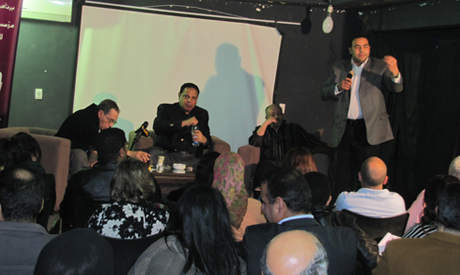
Al-Aswany during the salon and (Photo: Ayman Hafez)
Egyptians' tolerance for freedom of the media was tested during a hot political discussion in the monthly cultural salon lead by renowned Egyptian writer, Alaa Al-Aswany.
This session was dedicated to the writings of late extremist author, Sayed Kotb. Already a controversial topic, the session got into a heated debate when some audience members refused to allow Al-Umma Space channel to record the discussion. Alaa-Al Aswany is a liberal author renowned for his book The Yacoubian Building and the channel present to record the session is owned by Sheikh Abu Islam - known for his extreme views against Christianity.
Diplomatically, Al-Aswany called on the audience to vote, voicing his view was that the channel be allowed to record the discussion.
The result of this microcosmic test?
The majority of votes went to allow the channel to air the discussion, arguing that it is important to stick to the values of freedom and allow the audience of the religiously extreme channel to see a moderate, rational discussion of Kotb’s works.
Al-Aswany stressed that the need to discuss Kotb’s views is especially important these days, considering that his writings still influence Egypt's dominant political currents.
"The Islamists that are leading the country right now are practicing public work through a religious belief - and this is exactly wrong and leading us into the unknown. Public service is open to all people, unlike religious belief, which is an exclusive thought that only belongs to its followers. This is why we discuss Sayed Kotb today," Al-Aswany explained.
Al-Aswany sees that Kotb was one of the main Islamic thinkers that mixed religion with public service; something he considers a burden that we’re still carrying until now.
"Islamists now think that President Mohamed Morsi [who hails from Muslim Brotherhood leadership] is the representative of Islam, therefore you cannot criticise him because if you do, you’ll be criticising the religion itself," Al-Aswany said. "For this reason the democratic countries sideline religion from public works," he added.
Kotb's "just tyrant," theory seems to Al-Aswany a fancy term, however he praised Kotb’s literary works written before he turned into an extreme thinker that prohibits arts. Al-Aswany himself has received much attention for novels and political activism.
"I believe Sayed Kotb was a real artist with a high sense of creativity - you can clearly see this in his critical and literary works. He read Naguib Mahfouz and they visited each other, too, but it was too dangerous to be an artist and an Islamic thinker at the same time. It would not work - and it did not in his case," Al-Aswany added.
A writer specialised in Sayed Kotb's works, Hesham Eissa, gave the audience hints on Kotb's life and death, recounting the late thinker's violent intellectual turns.
Eissa said that his journey with Sayed Kotb started on 1965 when he opened the newspaper and was badly shocked to read that Kotb had been executed.
"It was strange for a regime to execute a man for his ideas while the state itself is publishing his books. The education ministry was publishing and distributing Kotb's works at the time he was executed. The paradox is that it would later be hard for us to find Kotb’s books," Eissa added.
Short link: